2011 was a challenging year for telcosacross the MEA , not least as a result of the socio-political situation that persisted throughout much of the year, causing heightened market uncertainty and a suspension of any large-scale M&A activity. Thus entrants on Comm.’s annual list of most effective service provider CEOs have had to be particularly adept at driving efficiencies and managing rapidly changing environments
NOTE: CEO s who have not been in their positions for a full twelve months prior to the compilation of this list are not eligible to be included.
Many of the top ranked service provider CEOs who graced Comm.’s inaugural Decisive Dozen list in 2010 did so as a result of being involved in some measure of deal making and inorganic growth, which
then had significant impact on their underlying businesses. With comparatively little M&A activity recorded in 2011, the constituents of this year’s list were included for their ability to navigate challenging operational circumstances that have impacted many service providers’ bottom as well as top lines.
As we mentioned in our inaugural list, this collection of CEOs is by no means exhaustive, and in fact we hope the compilation of such an article inspires debate. What is clear though is that the areas of focus that have characterised the business strategies of the individuals included in the list have shifted between 2010 and 2011. Organic growth and cost savings have been amongst the primary themes we have witnessed in 2011, as is continued investment in broadband networks, though such investments have been much more closely aligned with the potential new business opportunities they may produce.
We congratulate all the CEOs to be included in this year’s list for their tenacity and ability to adapt their focus areas in line with the changes in underlying market dynamics.
Hatem Dowadier, CEO of Vodafone Egypt, 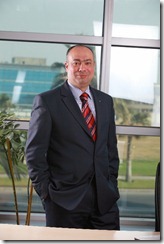
Saleh Al Abdooli, CEO of Etisalat Misr, 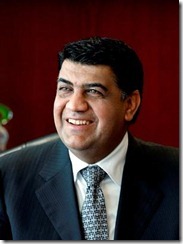 and
and
Hassan Kabbani, former CEO of Mobinil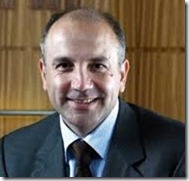
1.
For continuing operations in Egypt as normal as possible despite the massive civil upheaval the country underwent and continues to experience
2.
Adding Airtel’s personality and culture to the assets in Africa that were acquired from Zain Group
Manoj Kohli topped last year’s list given Airtel’s bold move to acquire Zain Group’s assets in Africa for almost US$11 billion. Since that time the Indian company has been hard at work injecting its own corporate identity into its operations on the continent, having initiated a number of efficiency drives and outsourcing activities in order to bring down the total cost of ownership.
Airtel recently announced it had signed up its 50 millionth mobile customer in Africa, having achieved this milestone within 17 months of acquiring Zain’s mobile operations in 16 African countries. The cellco has added 14 million new mobile customers since taking over operations in Africa, equating to just under 824,000 additions a month.
Airtel Africa claims to have invested approximately US$1 billion in network infrastructure during the current financial year, having been awarded twelve 3G licences across its operations. Earlier this year, the company expanded its footprint by being granted a licence to operate a GSM network in Rwanda.
Stéphane Richard, France Telecom Orange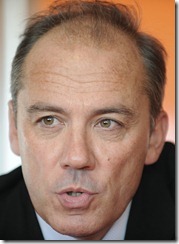
3.
Commitment to markets in Africa, particularly those in North Africa exposed to the Arab Spring, and continued innovation of products
Telkom Kenya (Orange) said that it would launch its HSPA+ enabled 3G network in July, the result of a Sh4 billion (US$44 million) investment by the company. The telco is installing 1,500 3G base stations and has been conducting internal trials in Nairobi and Mombasa.
Jordan Telecom Orange announced it planned to invest JD50 million (US$71 million) in its 3G network over the remainder of this year.
France Telecom Orange’s mobile money service, Orange Money, was launched in Botswana. Orange Money is a system that allows customers to carry out simple banking operations and transactions in total security. Orange partnered with Standard Chartered Bank to provide the service, having first launched Orange Money in Côte d’Ivoire in December 2008, and later expanded to Senegal, Madagascar, Mali, Niger and Kenya. Overall, Orange Money has now attracted over two million customers.
The above examples of France Telecom Orange’s activities in the MEA during the course of 2011 are the reasons Stéphane Richard has been included in the list again, given the overall strategic vision he is
allowing to be interpreted in local markets. The France Telecom Orange Group had a total of 221 million customers at the end of September 2011, up 6.3 per cent year-on-year on a comparable basis.
Saud Al Daweesh, CEO of STC Group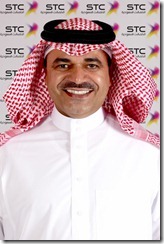
4.
Managing the Middle East region’s largest telco, while keeping the wheels of its international assets turning
Saud Al Daweesh’s inclusion in the list this year reflects STC’s huge scale domestically, regionally as well as internationally. The telco has continued to embrace broadband developments domestically, and is playing a significant role in bolstering its operations abroad. In Malaysia, for example, Maxis continues its leadership of the telecom market, enjoying a subscriber base of 13 million customers at the end of September 2011. In Indonesia, Axis was able to acquire new customers and increase its subscriber base during the nine months to end-September by more than 50 per cent to reach 15 million subscribers. In addition the Indonesian operator’s revenue has grown by 268 per cent in the nine months to end-September compared to the same period last year.
5.
Steady progress and remaining one of the region’s most likely sources of consolidation activity
Qtel Group has become a perennial telco heavyweight in the region, blending scale, ambition and patience in order to remain relevant in telecom environments that have witnessed quite a lot of change. Qtel boasts a well-diversified telecom asset portfolio, including large and high-growth markets such as Indonesia, Iraq, and Algeria, and smaller but advanced markets such as Qatar, Kuwait, and Oman.
Analysts at Deutsche Bank note that Qtel’s business expansion has allowed the company to grow its market cap from US$5.7 billion at the end of 2005 to around US$7.3billion currently (+28 per cent in six years), while its consolidated revenue and EBITDA increased ten-fold and seven-fold over the same period, respectively.
Ever the pragmatist, Nasser Marafih has stated that the telco is waiting for further consolidation in the telecom sector before carrying out new acquisitions, believing the current valuations placed on telecom assets are still too high and not sustainable, particularly for standalone telcos. However, the operator remains keen on bidding for new licences in Syria and Libya should the political situation in both countries stabilise.
In the interim, Qtel has been focussing on developing broadband infrastructure in all of its international markets. Domestically, the telco recently announced the launch of its LTE programme, which it claims will deliver the fastest and largest 4G network in Qatar. The project will deploy nearly 900 base stations across the country, with implementation having already begun.
6.
Successfully and profitably running a second entrant operator despite the attention of a strong, well-established incumbent
Osman Sultan was not included in the 2010 list and we received a good number of queries asking why that was the case. We believe that part of the reason was the fact that Du is a domestically-focussed operator, and while many of the CEOs in last year’s honours were recognised for having to execute on a regional or international stage, Sultan’s local outlook led to his omission.
What makes his inclusion in this year’s edition so pertinent is that it reflects a wider theme across the MEA region, with CEOs concentrating more on operational excellence and customer satisfaction than they are on inorganic growth. Thus Sultan is credited in 2011 with continuing to create value for Du shareholders, and establishing the telco as a genuine contender and alternative to the UAE’s incumbent operator. Having reported its first full year net profit in 2008, less than two years after commercial launch, Du has gone on to consolidate its financial and operational position.
The telco reported that it added 162,000 net active mobile subscribers during Q311 to end-September, to bring its total base to 4.938 million. The telco also experienced 24 per cent year-on-year growth in the fixed-line business to 639,700 lines at the end of September. Revenue for the quarter was up 28 per cent year-on-year to AED2.234 billion (US$609 million), with net profit before royalty increasing by a staggering 50 per cent year-on-year to AED489 million.
Mikael Grahne Millicom International
7.
Navigating the political, currency, and economic risk in some of Africa’s most difficult markets
Millicom International – the holding company that operates mobile networks mainly in Africa and Latin America – reported third quarter revenues rose by 13.1 per cent to US$1.15 billion. Excluding currency fluctuations, revenues would have risen by 9.1 per cent compared to a year ago. EBITDA was also up, by 9.3 per cent to US$529 million. Mobile customers were up 13 per cent compared to Q310, bringing the total customer base to 42.2 million.
Millicom has a presence in Chad, the Democratic Republic of Congo, Ghana, Mauritius, Rwanda, Senegal, and Tanzania, making some of its bases of operation difficult to live in, let alone run a successful business.
“In Africa, excluding Ghana and Senegal, our operations performed well during the quarter (Q311) growing on average by 16 per cent in local currency. In Ghana we adjusted our prices due to the introduction of flat tariffs and specific promotions by our competitors. In Senegal our revenues were affected by capacity constraints associated with power shortages,” Mikael Grahne, president and CEO of Millicom said at the release of the company’s third quarter results.
Grahne reiterated the company’s full-year guidance of an EBITDA margin of above 45 per cent, and a revision of the company’s CAPEX guidance to around US$820 million due to some delays in the delivery of equipment.
Naguib Sawiris, Wind Telecom, Orascom Telecom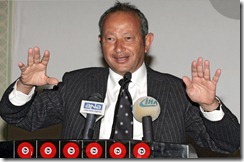
8.
Timing and execution of sale of Weather Investments and Orascom Telecom Holding to VimpelCom
Naguib Sawiris was included in 2010’s list given his deal making prowess with respect to first holding discussions with South Africa’s MTN Group, and then finally agreeing to sell his telecom assets to Russia’s VimpelCom. In April 2011 VimpelCom announced it had completed the merger with Egypt’s Wind Telecom, giving it 51.7 per cent of Orascom Telecom and the entire ownership of Wind Italy. The combination of VimpelCom and Wind Telecom created the world’s sixth largest mobile telecommunications provider by number of subscribers with operations in 20 countries. Total mobile subscriber base reached 181 million as of end-December, 2010.
VimpelCom paid a cool US$6 billion for Wind and Orascom, which included a cash consideration amounting to US$1.495 billion. Sawiris’ timing of confirming the sale of the majority of his telecom assets just as market sentiment changed in the region as a result of the Arab Spring does reinforce his reputation as a masterful businessman who has an incredible sense of commercial timing.
9.
First operator to launch 3G in Jordan, followed by the need to adapt to the entrance of 3G competition at the end of an exclusivity period
At the beginning of March 2010, Orange Jordan became the country’s first operator to launch 3G, enjoying an official exclusivity period that extended to just under 12 months. Within that time the telco looked to establish a strong brand association with the technology and the services it enabled ahead of the introduction of competition.
By the end of 2010, nine months after launching the network, Orange Jordan counted 150,000 3G subscribers, with this number doubling to 300,000 by the middle of February 2011, highlighting the impressive ramp-up the technology received.
Earlier this year, Khawam said Orange Jordan plans to invest JD50 million (US$71 million) in its 3G network over the remainder of the year. She said the company had 500,000 3G subscribers at the end of May, just over a year after it launched. Previously Khawam said the company aims to have 900,000 3G subscribers by the end of 2011.
10.
Completed a successful round of funding and continuing to be the leading MVNO in the ME region
At the end of April 2011 pan-regional MVNO Friendi Group announced it had secured an additional US$25 million of funding from existing and new shareholders. The investment was aimed at further accelerating expansion plans across the Middle East, Africa and Asia region, setting the company on course for an initial public offering in another 2-3 years.
The latest tranche of financing is enough to fuel Friendi Group’s entry into a further 3-4 markets, which is something Mikkel Vinter is keen to see happen before considering a move to IPO in the 2012/2013 timeframe.
Friendi Group has a presence in Jordan, Oman, and Saudi Arabia, and continues to prospect for new opportunities. Back in 2006 when Friendi Mobile first launched commercially, a number of competitors were also eyeing the nascent MVNO opportunity in the wider Middle East region, though none have been able to replicate Friendi Group’s multi-market approach.
11.
Maintaining momentum at Safaricom following the departure of visionary leader Michael Joseph
Bob Collymore had huge shoes to fill when he took over as Safaricom CEO effective November 1, 2010. His predecessor, Michael Joseph had been in the job 10 years, and in that time helped preside over the development and launch of mobile payment platform M-Pesa, which has since garnered international plaudits while also boosting Safaricom’s coffers significantly.
Collymore does face very real challenges when it comes to maintaining profitability at acceptable levels given that the cellco reported a decline in net profit of almost 50 per cent year-on-year for the six months to end-September 2011. Collymore attributed the performance to a more than 50 per cent decline in calling rates, high inflation that cut down on spending, high foreign exchange rates on the shilling and increased fuel costs.
However, in other operational areas of the business, Safaricom remains a giant. Voice revenues fell 5.5 per cent over the six-month period with the effect being cancelled out by a 30.4 per cent growth in data revenues. Data growth included a 49.3 per cent growth in M-Pesa mobile money transfers revenue, and a 36.3 per cent growth in total data revenues.
12.
Implementation of bold outsourcing model, preparation for IPO
Emad Makiya has had to learn fast having been appointed CEO in June 2010. He seems to have done so; steering Zain Iraq on a massive cost efficiency drive that culminated in it signing a US$650 million five-year network outsourcing agreement with Ericsson and its local partner SIM (Service in Motion). Under the agreement, Ericsson will optimise, modernise and manage IT operations and Zain’s mobile network in Iraq that currently includes more than 3,700 sites across the country. The agreement also extends to the northern region of Kurdistan where Zain has recently launched commercially.
Makiya is also playing an instrumental role in the planned listing of Zain Iraq stock on the Iraq Stock Exchange, which is likely to occur in 2012.

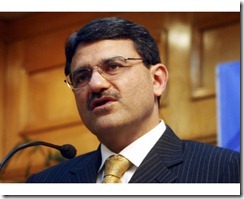
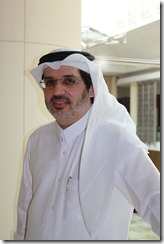
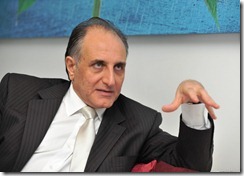
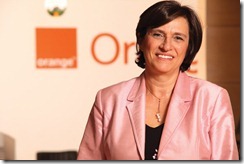
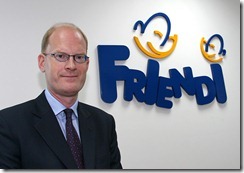
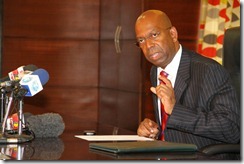
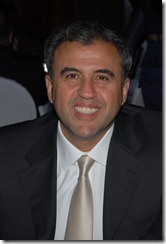




0 comments ↓
There are no comments yet...Kick things off by filling out the form below.
Leave a Comment